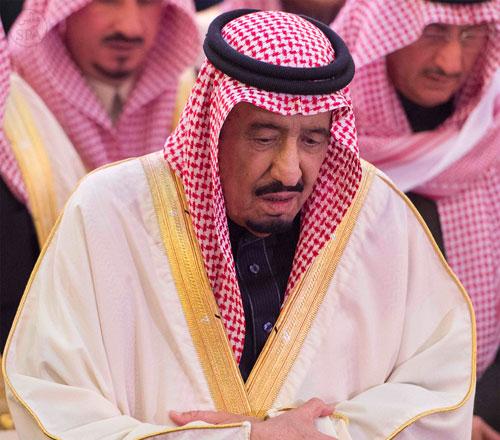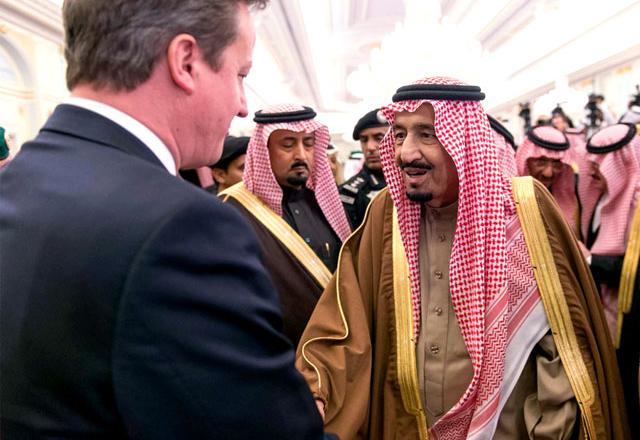You are here
World leaders head to Saudi Arabia after king’s death
By AFP - Jan 24,2015 - Last updated at Jan 24,2015

Riyadh — World leaders headed to Saudi Arabia Saturday to offer condolences following the death of King Abdullah, with US President Barack Obama cutting short a trip to India to pay respects.
Obama had been scheduled to visit the Taj Mahal but cancelled that following the death of King Abdullah and will travel to Riyadh on Tuesday, the White House said.
British Prime Minister David Cameron, Prince Charles and French President Francois Hollande were among the leaders expected in the Saudi capital on Saturday to offer condolences to new King Salman.
King Abdullah was a cautious reformer who led the Gulf state through a turbulent decade in a region shaken by the Arab Spring uprisings and Islamic extremism.
He died on Friday at the age of about 90 after being hospitalised with pneumonia.
Since King Abdullah took the throne in 2005, Riyadh has been a prime Arab ally of Washington, last year joining the coalition carrying out air strikes against the Islamic State jihadist group.
World leaders have praised the king as a key mediator between Muslims and the West, but campaigners criticised his rights record and urged King Salman to do more to protect freedom of speech and women's rights.
Gulf rulers and leaders including Turkish President Recep Tayyip Erdogan and Pakistani Prime Minister Nawaz Sharif, were among those who attended King Abdullah's traditionally simple funeral at Riyadh's Imam Turki Bin Abdullah Mosque on Friday.
Africa was also represented, with Sudanese President Omar Bashir and Ethiopian Prime Minister Hailemariam Desalegn.
President Ali Bongo Ondimba of Gabon arrived on Saturday to pay respects.
On Friday, the late king's body, wrapped in a cream-coloured shroud, was borne on a litter by members of the royal family wearing red-and-white checked headgear.
The body was quickly moved to nearby Al Od public cemetery and buried, in a grave marked only by a book-sized plain grey stone.
Palestinian President Mahmoud Abbas and Malaysia's Prime Minister Najib Razak arrived later to deliver condolences, as did Iraqi President Fuad Masum.
Masum had met with King Abdullah last November, helping to repair long-strained relations between the neighbours.
On Friday evening, hundreds of Saudis queued to enter a royal palace where they rubbed cheeks and kissed the hands of their new leaders, in a symbolic pledge of allegiance.
Similar pledge gatherings were planned for Saturday and Sunday evenings.
Valued ally
Obama paid tribute to King Abdullah as a "valued" ally as the State Department indicated cooperation between Washington and Riyadh would continue.
King Salman pledged to keep the conservative, oil-rich Muslim kingdom on a steady course and moved to cement his hold on power.
In his first public statement as monarch, King Salman, 79, vowed to "remain, with God's strength, attached to the straight path that this state has walked since its establishment".
He called for "unity and solidarity" among Muslims and vowed to work in "the defence of the causes of our nation".
Moving to clear uncertainty over the transition to the next generation, he named his nephew, Interior Minister Prince Mohammed Bin Nayef, 55, as second in line to the throne behind Crown Prince Moqren, 69.
That helps to solidify control by his Sudayri branch of the royal family.
Prince Salman also appointed one of his own sons, Prince Mohammed, as defence minister of the world's leading oil exporter and the spiritual home of Islam.
"In spite of all the earlier articles and fears surrounding the succession, the Saudi royal family handled the succession without even a hint of crisis and laid the ground work for the future," wrote Anthony Cordesman, of the Washington-based Centre for Strategic and International Studies.
Since the death in 1953 of the kingdom's founder, King Abdul Aziz Bin Saud, the throne has passed systematically from one of his sons to another.
As the top producer in the Organisation of the Petroleum Exporting Countries, Saudi Arabia has been the driving force behind the cartel's refusal to slash output to support oil prices, which have fallen by more than 50 per cent since June.
Ali Al Naimi remains the kingdom's oil minister and the International Energy Agency's chief economist said he did not foresee major policy shifts.
"I expect and hope that they will continue to be a stabilisation factor in the oil markets," Fatih Birol told AFP.
Royal family stalwart
Saudi Arabia is home to Islam's holiest sites and its role as a spiritual leader for Sunni Muslims has seen it vying for influence with Shiite-dominated Iran.
Tehran nonetheless offered its condolences, saying Foreign Minister Mohammad Javad Zarif would arrive in Riyadh on Saturday.
Behind his thick, jet-black moustache and goatee, Abdullah had a shrewd grasp of regional politics.
Wary of the rising influence of Islamist movements, Saudi Arabia has been a generous supporter of Egyptian leader Abdel Fattah Al Sisi since the army ousted Mohamed Morsi of the Muslim Brotherhood.
Egypt declared seven days of official mourning for King Abdullah, and sent its prime minister to the funeral.
Riyadh has also played a key role in supporting opposition to Iranian-backed President Bashar Assad of Syria and will allow US troops to use its territory to train rebel fighters.
King Salman is widely expected to follow closely in King Abdullah's footsteps, in foreign and energy policy as well as in making moderate reforms.
King Abdullah pushed through cautious changes, challenging conservatives with such moves as including women in the advisory shura council.
He promoted economic development and oversaw accession to the World Trade Organisation, tapping into massive oil wealth to build new cities, universities and railways.
But the kingdom is still strongly criticised for a dismal human rights record, including the imprisonment and flogging of dissidents. It is also the only country in the world that does not allow women to drive.
While Saudi Arabia has managed to avoid the social upheaval that has shaken many of its neighbours in recent years, thanks in large part to massive public spending, the new king will face some major challenges, especially as falling oil prices cut into state revenues.
Related Articles
More foreign leaders flocked to Saudi Arabia paying their respects to King Salman Sunday, as the normally gridlocked streets of Riyadh turned quiet on a day of mourning for his predecessor King Abdullah.
US President Barack Obama led a heavyweight delegation to Saudi Arabia Tuesday to meet new King Salman and discussed the two countries' ongoing fight against the Islamic State (IS) group.
Qatar's ruler was in Saudi Arabia on Tuesday for talks with the newly enthroned King Salman about the deteriorating security situation in Yemen and relations with Egypt.












